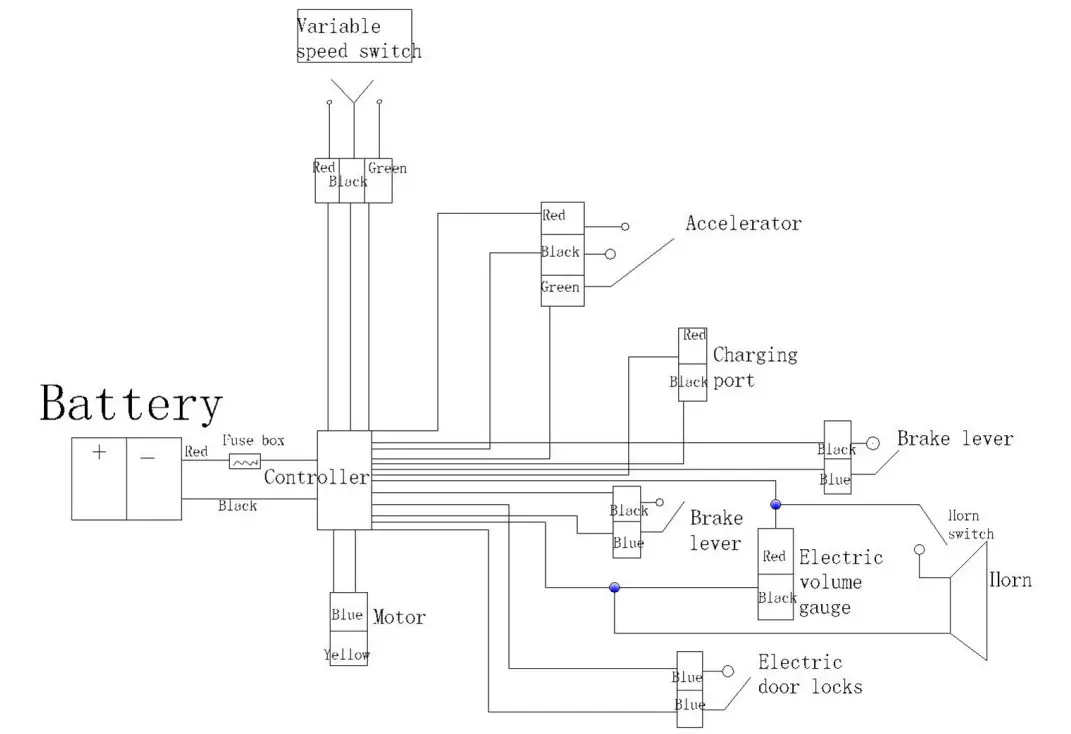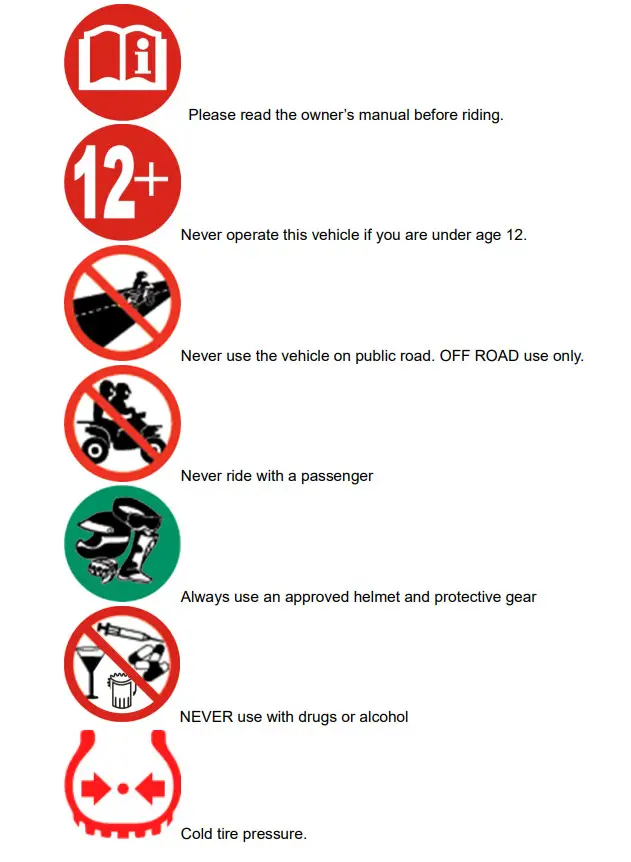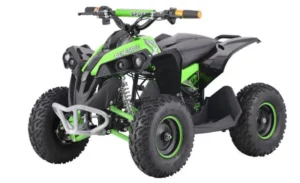
 Elektrisk Mini ATV Nitrox Dragon Elektrisk Mini ATV Nitrox Dragon
Elektrisk Mini ATV Nitrox Dragon Elektrisk Mini ATV Nitrox Dragon
Instruction Manual
Important Information! Read thoroughly before driving the first time.
All information, images, and specifications contained in this manual are based on the latest product information available at the time of publication. Due to improvements or production changes, there could be discrepancies in this manual. We reserve the right to make product changes at any time, without notice and without obligation to make the same or similar changes to any vehicle previously built or sold.
INTRODUCTION
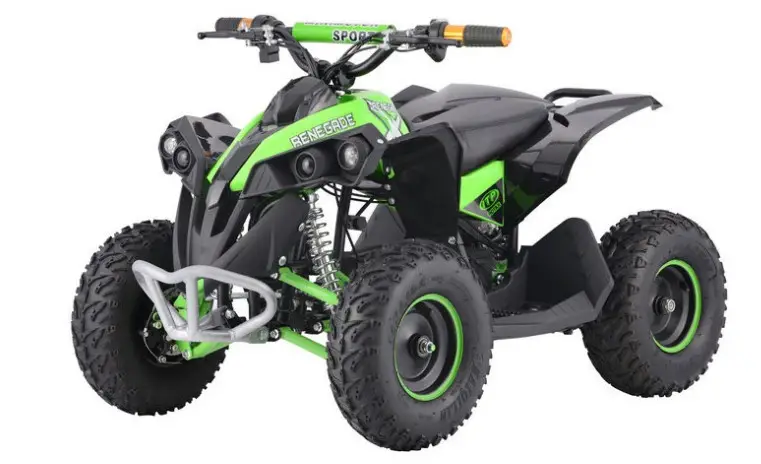
Thank you for purchasing this mini ATV. The proper care and maintenance that your vehicle requires is outlined in this manual. Following the instruction will ensure a long trouble-free operating life of this vehicle and your satisfaction with it.
The owner’s manual corresponded to the latest state of this vehicle at the time of printing.
Slight deviations resulting from continuing development and design can, however, not be completely excluded. All specifications are non-binding, we reserve the right to modify or delete technical specifications, parts, designs, etc… without prior notice.
SAFETY WARNINGS
This vehicle is NOT A TOY and is ONLY used in closed-off areas remote from public road traffic.
Never permit children under age 12 to operate this ATV.
Adult supervision is required if children are under the age 16.
WARNING: Riding an electric mini quad can be a hazardous activity. Certain conditions may cause the equipment to fail without the fault of the manufacturer. Like other electric vehicles, the Mini Quad can and is intended to move, and it is, therefore, possible to lose control, fall off and/or get into dangerous situations that no amount of care, instruction or expertise can eliminate. If such things occur you can be seriously injured or die, even when using safety equipment and other precautions. RIDE AT YOUR OWN RISK AND USE COMMON SENSE.
This manual contains many warnings and cautions concerning the consequences of failing to maintain, inspect or properly use your mini ATV. Because any incident can result in serious injury or even death, we do not repeat the warning of possible serious injury or death each time such a possibility is mentioned.
APPROPRIATE RIDER USE AND PARENTAL SUPERVISION
This manual contains important safety information and use tips to help you and your child operate and handle the mini ATV. Carefully read the manual in its entirely together with your child before letting your child ride it for first time. The manual also contains important information on servicing the vehicle.
It is your responsibility to review the manual and make sure that all riders understand all warnings, cautions, instructions, and safety topics and assure that the riders are able to safely and responsibly use this product and protect your child from injury. We recommend that you periodically review and reinforce the information in this manual with your child and that you inspect and maintain your children’s vehicle to insure their safety. The recommended rider age of 12 years is only an estimate, and can be affected by the rider’s size, weight, and skills. Any rider unable to fit comfortably on the mini ATV should not attempt to ride it.
It is important and necessary to conduct technical training for your child before first use. To get the train information, please contact the dealer who you purchase the vehicle from. Before your child completes the training, do not let your child use this vehicle.
Children often underestimate or fail to recognize the dangerous situation, you should make it clear to your child that should not, under any circumstances, operate the vehicle without supervision and that your child may only drive at speed that is commensurate with the child’s riding ability and other road condition.
A parent’s decision to allow his or her child to ride this product should be based on the child’s maturity, skill and ability to follow rules.
Keep this product away from small children younger than age 12 and remember that this product is intended for use only by persons who are, at a minimum, completely comfortable and competent while operating the vehicle.
DO NOT EXCEED THE WEIGHT LIMIT OF 70KG. Rider weight does not necessarily mean a person’s size is appropriate to fit or maintain control of the mini ATV Do not touch the brakes or electric motor on your mini ATV when in use as they can become very hot.
Refer to the following section on safety for additional warnings.
ACCEPTABLE RIDING PRACTICES AND CONDITIONS
Always check and obey any local laws or regulations which may affect the locations where the Mini ATV may be used.
Ride defensively. Watch out for potential obstacles that could catch your wheel or force you to swerve suddenly or lose control. Be careful to avoid pedestrians, skaters, skateboards, scooters, bikes, children or animals who may enter your path, and respect the rights and property of others.
The mini ATV is meant to be used on private property and on closed courses and not on public streets or sidewalks. Do not ride your mini ATV in any areas where pedestrian or vehicle traffic is present.
Do not activate the speed control on the hand grip unless you are on the MINI ATV and in a safe, outdoor environment suitable for riding.
This product was manufactured for performance and durability but was not impervious to damage. Jumping or other aggressive riding can over-stress and damage any product, including the Mini ATV, and the rider assumes all risks associated with high-stress activity.
Be careful and know your limitations. Injury risks increases when the degree of riding difficulty increases. The rider assumes all risk associated with aggressive riding activities.
Never carry passengers or allow more than one person at a time to ride the electric mini quad.
Never use near steps or swimming pools.
Never use alcohol or drugs before or while operating Keep your fingers and other body parts away from the steering system, wheels and all other
moving components.
Never use headphones or a cell phone when riding.
Never hitch a ride with another vehicle.
Do not ride the min quad in wet or icy weather and never immerse the electric mini quad in water, as the electrical and drive components could be damaged by water or create other possibly unsafe conditions.
Wet, slick, bumpy, uneven or rough surfaces may increase risks of use. Do not drive the electric quad in mud, ice, puddles or water. Avoid excessive speeds that can be associated with downhill rides. Never risk damaging surfaces such as carpet or flooring by use of an electric four-wheeler indoors.
Do not ride at night or when visibility is limited.
PROPER RIDING ATTIRE
Always wear proper protective equipment such as an approved safety helmet, elbow pads and kneepads. A helmet may be legally required by local law or regulation in your area.
A long-sleeved shirt, long pants and gloves are recommended. Always wear athletic shoes, never drive barefoot or in sandals, and keep shoelaces tied and out of the way of the wheels, motor and drive system.
USING THE CHARGER (The charger is not a toy!)
The charger supplied with the electric mini quad should be regularly examined for damage to the cord, plug, enclosure, and other parts, and in the event of such damage, the quad must not be charged until the charger has been repaired or replaced. Always disconnect from the charger prior to wiping down and cleaning your electric mini quad with liquid.
FAILURE TO USE COMMON SENSE AND HEED THE ABOVE WARNINGS INCREASES THE RISK OF SERIOUS INJURY. USE WITH APPROPRIATE CAUTION AND SERIOUS ATTENTION TO SAFE OPERATION.
BEFORE YOU BEGIN
Remove contents from box. Remove the foam separators that protect the components from damage during shipping. Inspect the contents of the box for scratches in the paint, dents or kinked cables that may occur during shipping. Because the product was 85 percent assembled and packed at the factory, there should not be any problems, even if the box has a few scars or dents.
Estimated Assembly and Set-Up Time
We recommend assembly by an adult with experience in motorbike or bicycle mechanics. Allow up to 30-40 minutes for assembly, not including initial charge time.
Allow up to 12 hours for the initial charge.
Required Tools
Some tools may be supplied; however, we recommend the use of mechanic’s grade tools. Use the supplied tools only as a last resort.
The list of tools required is as follows
- Open-end wrench 10mm / 13mm/ 17mm / 22mm
- Allen wrench 5mm / 6mm/ 8mm
- Bicycle-style tire pump with pressure gauge
Assembly illustration and instruction
Attaching the Rear Wheels (tire 13*5.0-6 or 14*5.0-6) 
| A. Pin | B. Rear axle |
| C. Rear wheel locknut | D. Rear wheel |
- Place pin A on rear axle B.
- Place rear wheel D on rear axle B.
- Tighten C by a wrench.
Attaching the handlebar

| A. Handlebar down clamp 2PCS | B. Flange bolt M10*20 2PCS |
| C. Steering rod | D. Hex socket cap bolt M8*20 4PCS |
| E. Handlebar up clamp 2PCS | F. Lock nut M10 2PCS |
| G. Handlebar |
- Place parts A on C.
- Place B through parts A & C and then tighten F by a wrench.
- Place part G on part s A. Align E to parts A and tighten D by an 8mm key wrench.
NOTE: When properly tightened, the handlebar should not move forward or back.
Attaching the front wheels (tire 4.10-6 or 14*4.10-6) 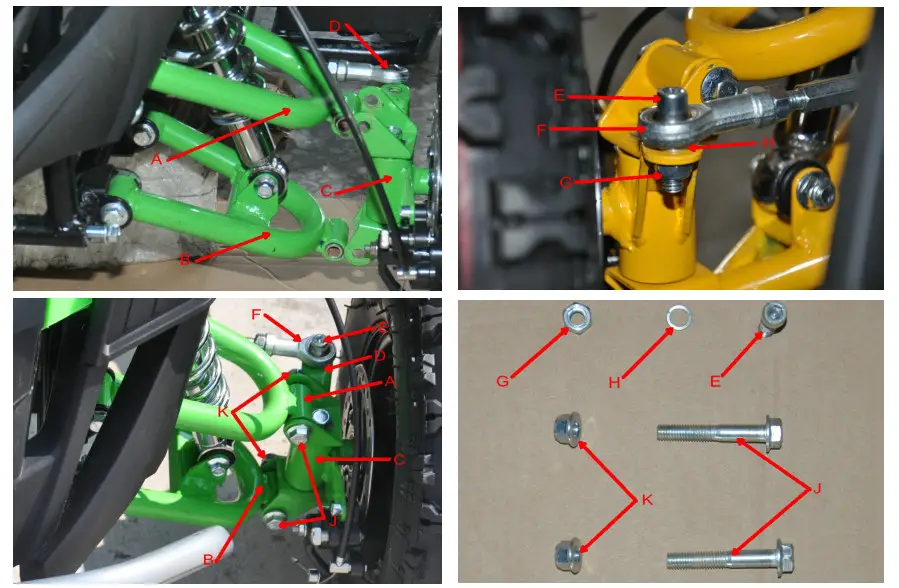
| A. Up swing arm | B. Down swing arm |
| C. Wheel spindle | D. Tie rod holder |
| E. Hex socket cap bolt M8*25 | F. Tie rod end |
| G. Lock nut M8 | H. Spacer M8 |
| J Flange bolt M8*45 2PCS | K. Self-lock nut M8 2PCS |
- Align C to A & B.
- Place bolts J though A & C, B & C. Tighten nuts K by wrenches.
- Place bolt E through F, H, and E in sequence and tighten nut H.
Attaching front Bumper

| A. Flange bolt M8*16 2PCS | B. Lock nut M8 |
| C. Front bumper | D. Flange bolt M8*16 |
- Align C to ATV frame
- Tighten bolts A by a wrench.
- Tighten B,D by wenches.
Attaching rear Bumper 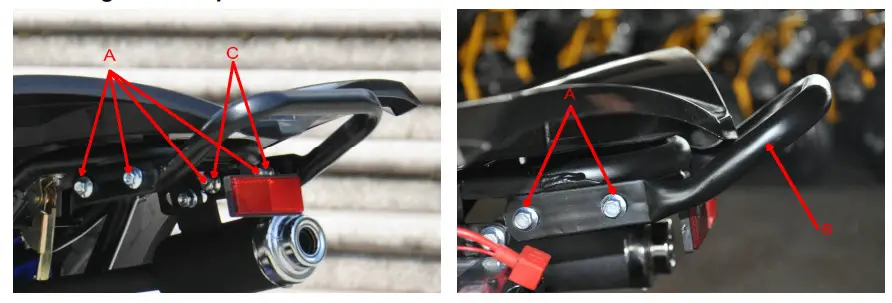
| A. Flange bolt M8*16 4PCS | B.Rear bumper |
| B. Lock nut M8 |
- Align B to ATV frame.
- Tighten A,C by wenches.
PRODUCT DESCRIPTION
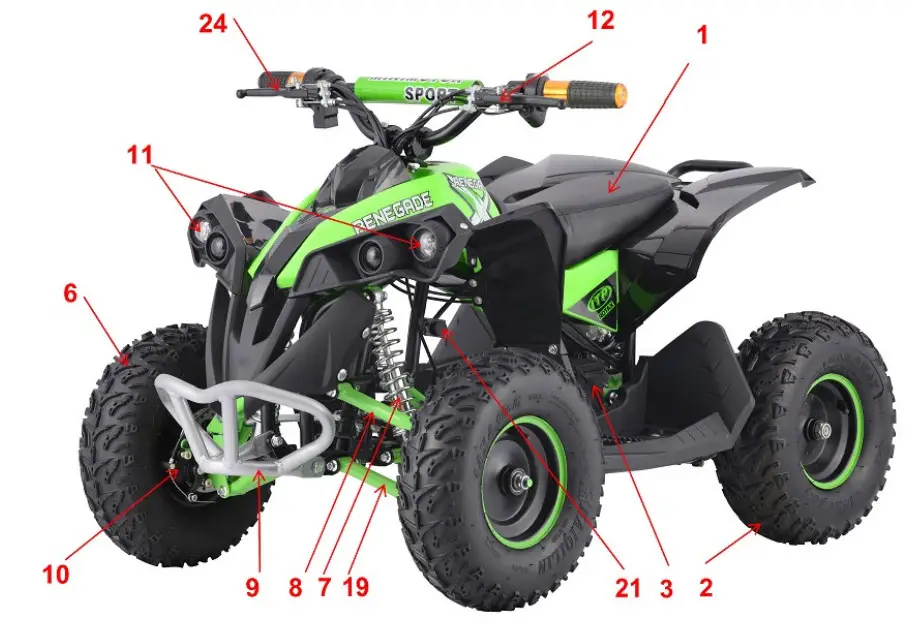 |
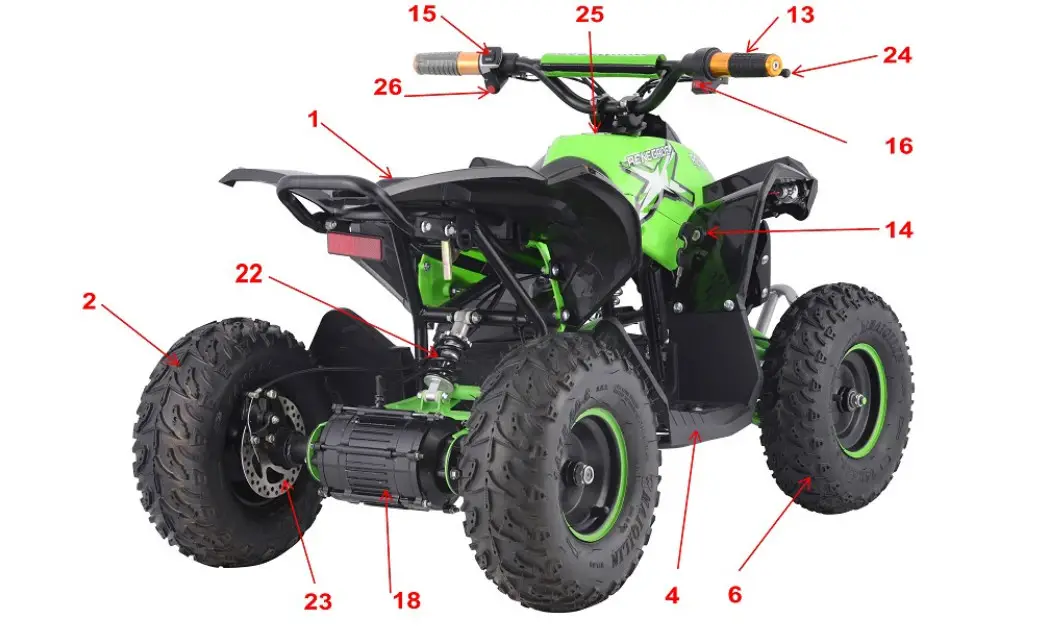 |
| 1. seat | 2. rear tire | 3. battery |
| 4. footrest | 5. fuse case | 6. front tire |
| 7. front shock | 8. front up the swing arm | 9. bumper |
| 10. front disk brake | 11. headlight | 12 rear brake lever |
| 13. throttle | 14. ignition key | 15. headlight on/off button |
| 16. forward/reverse switch | 17. three-speed limit button/key | 18. motor |
| 19. front down the swing arm | 20. rear axle | 21. charger plug |
| 22. rear shock | 23. rear disk brake | 24. front brake lever |
| 25. battery indicator | 26. horn button |
FUNCTION SWITCH OF 3 SPEED LEVEL ADJUSTABLE
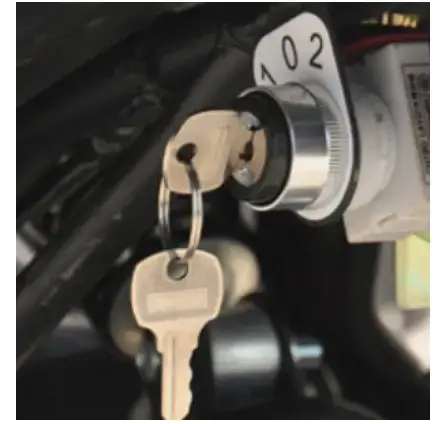
The 3-speed limit key is located under the right side of the seat (see the above pictures).
There are 3 letters standing for the different speeds as follows:
1 (or M): Middle speed
0 (or L): Lowest speed
2 (or H): Highest speed
SAFETY REMINDERS
PRE-RIDE CHECKLIST
Loose Parts
Check and secure all fasteners before every ride. Make sure steering stem clamp bolts are locked properly in place. There should not be any unusual rattles or sounds from loose parts or broken components. If you are not sure, ask an experienced mechanic to check.
Brake
Check the brake for proper function. When you squeeze the lever, the brake should provide positive braking action. When you apply the brake with the speed control on, the brake cut-off switch will stop the motor.
Frame, Fork and Handlebars
Check for cracks or broken connections. Although broken frames are rare, it is possible for an aggressive driver to bash into a curb or wall and wreck and bend or break a frame. Get in the habit of inspecting yours regularly.
Tire Inflation
Periodically inspect the tires for excess wear, and regularly check the tire pressure and re-inflate as necessary. If you get a flat tire, the inner tube can be patched or a new tube can be purchased from Razor or an authorized repair center.
Safety Gear
Always wear proper protective equipment such as an approved safety helmet, elbow pads and kneepads. Always wear shoes (lace-up shoes with rubber soles), never drive barefooted or in sandals, and keep shoelaces tied and out of the way of the wheels, motor and drive system
Charging the Battery
Your electric mini quad may not have a fully charged battery; therefore it is a good idea to charge the battery prior to use.
- suggested Initial charge time: 9 hours
- Run time: up to 45minutes
- Average battery life: 250 charge/discharge cycles (Lead-Acid battery), 500 charger/discharge cycles(lithium battery).
- Recharge time: Always remember to turn the power switch off and fully charge the battery after each use. When a vehicle is not in regular use, recharge the battery at least once a month until normal use is resumed. If you have left the power switch on or your product has not been charged for a long period of time the battery may reach a stage at which it will no longer hold a charge.
WARNING: Always disconnect your electric mini quad from the charger before cleaning with liquid.
The charger has a small window with two LEDs to indicate the charge status. Red LED means the battery is in charging and Green LED means the battery is full charged. Chargers have built-in over-charge protection to prevent the battery from being over-charged.
Be sure to properly align the groove on the charger input port with the corresponding socket on the Mini Quad and tighten threads; otherwise, no charging action will occur. 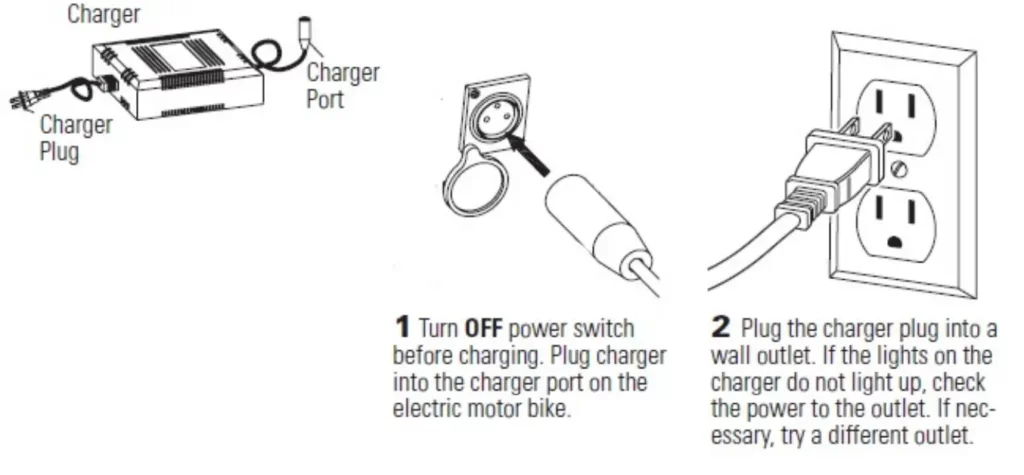
Warning: Failure to recharge the battery at least once a month may result in a battery that will no longer hold a charge.
Inflating the Tires
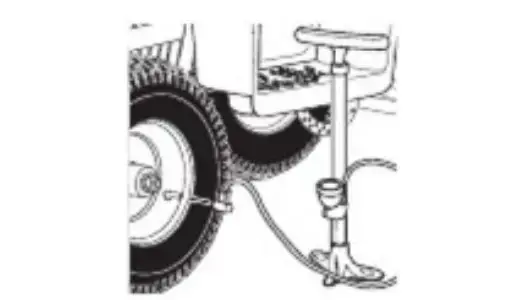
NOTE:
Please read the specification sheet to get the information of tire pressure.
Using a bicycle-style tire pump to inflate the tires to the PSI indicated on the sidewall of the tire.
Note: The pressurized air supplies found at gasoline stations are designed to inflate high-volume automobile tires. If you decide to use such an air supply to inflate your tires, first make sure the pressure gauge is working, then use very short bursts to inflate to the correct
PSI. If you inadvertently over-inflate the tires, release the excess pressure immediately.
Important information of use guide for tire
Note: The tire is the only contact between the vehicle and the road, the safety of various driving activities depends on the small area of tire where contact with the road. Therefore, it is very important to keep the tire in good condition any time and use the correct size and standard tire to replace the old ones.
Guide:
Tire assembly and disassembly
It is strongly recommended that the tire assembly and disassembly should be done by an authorized technician with the necessary skills.
Tire inflating pressure
It is very important to keep the tire in proper pressure and check the tire pressure before use.
The inflating should be done while the tire is cold.
Tire maintenance
Tire tread depth should be checked regularly.( Shallower tread means less grip of tire). You must stop to use the vehicle if the tire is pierced, disassemble the tire and check it carefully.
Tire maintenance should be done by an authorized technician. The tire should be replaced immediately when it is distorted or damaged.
Tire replacement
It is important to use the correct size and standard tire as per our specification (see details in the technical specification sheet)
Don’t use the used tire if you are not sure its previous service condition.
Tire aging
Tire aging is unavoidable even if the tire is not ever used or just used a few times. Tire aging is mainly reflected in the cracked section on side of the tire and tire tread, sometimes the tire is distorted as well. The used and aged tire should be checked and confirmed if it is ok to use again by an authorized technician
REPAIR AND MAINTENANCE
Turn the power switch off before conducting any maintenance procedures.
Adjusting the Brake
The mini quad is with 2 front brakes and 1 rear brake.
WARNING: The brake is capable of causing the electric mini quad to skid the tire throwing an unsuspecting rider. Practice in an open area free from obstacles until you are familiar with the brake function. Avoid skidding to a stop as this can cause you to lose control or damage the rear tire.
Step 1:
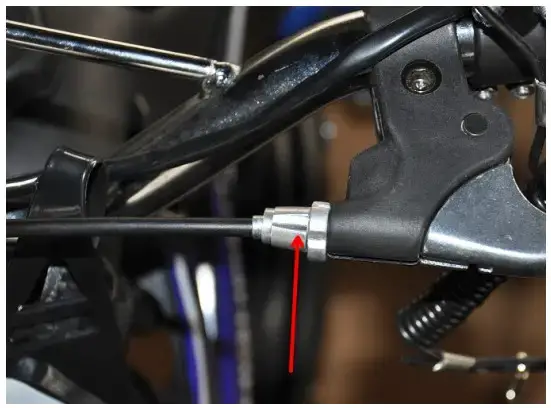
To adjust the brake tension, thread the brake lever adjuster in or out 1/4 or 1/2 turn until the required brake adjustments are attained.
Most of the brake adjustments are complete at this step. If the brake still needs further adjustment, proceed to step 2.
Step 2:
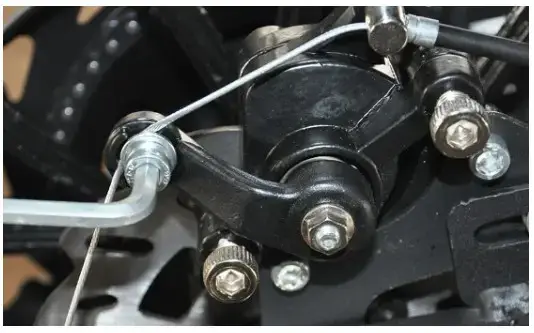
If the brake has too much slack, loosen the rear anchor bolt with an L-wrench and pull the brake wire tighter.
The distance of the brake wire between the end of the cable and the anchor bolt should be between 37mm and 44 mm.
Step 3:
If the brake rotor is dragging on the brake pads, use L-wrench to twist the caliper bolts in either direction until rotor is centered between pads.
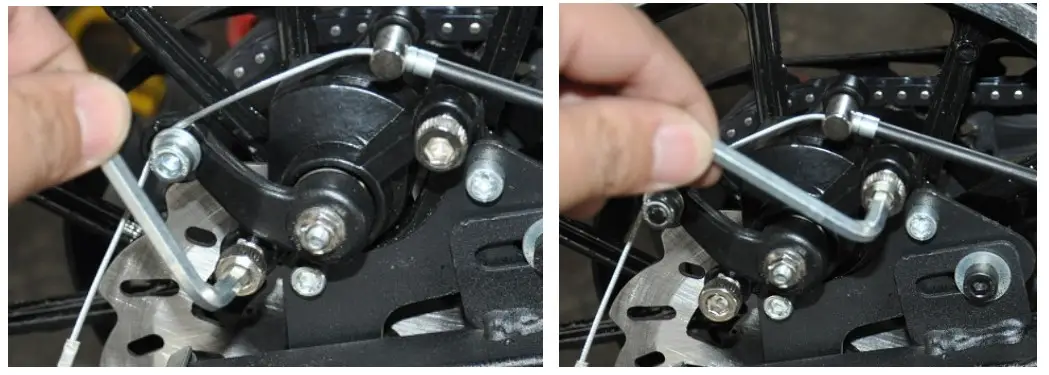
Check
To check the wear of front and rear brake pads A, simply inspect the brake calipers as shown in the below picture.
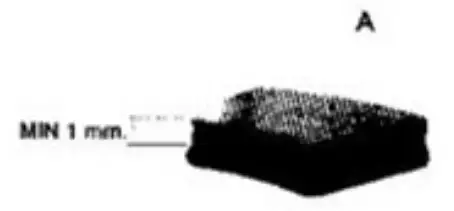
The thickness of the lining on the ends of the four pads should never be less than 1mm.
Should the lining be thinner, immediately replace the brake pads?
We recommend having the brake pads replaced by an authorized dealer.
Replacing the Fuse
- Open the battery bag to locate the fuse box attached to the batteries.
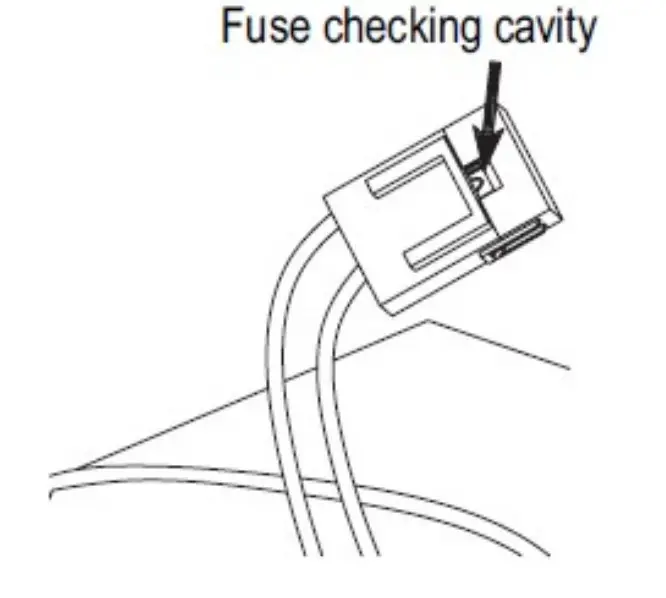
- Check the fuse to see if it has burnt out. If the fuse is damaged, open the fuse cover.
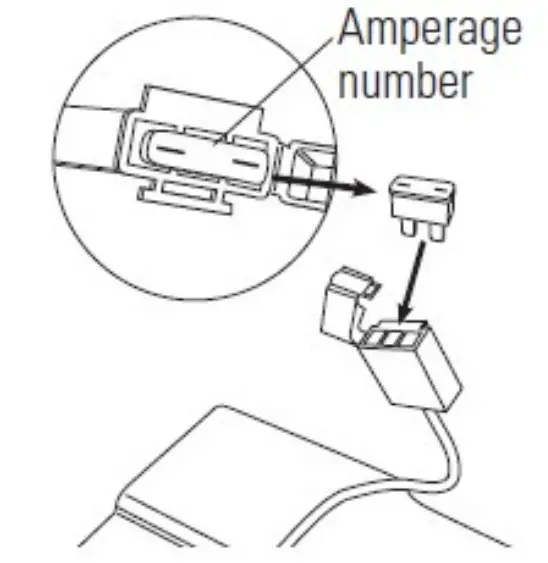
- Remove any fuse that is damaged or burnt out and replace it with a new one of equal amperage.
Note: Amperage is located on top of the fuse.
Battery Care and Disposal
![]() Do not store the battery in temperatures above 75° F or below -10° F.
Do not store the battery in temperatures above 75° F or below -10° F.
CONTAINS SEALED LEAD OR LI-ION BATTERIES. BATTERY MUST BE RECYCLED.
TROUBLESHOOTING GUIDE
| Problem | Possible cause | Solution |
| The vehicle does not run. | Undercharged battery Charger is not working. | Charge the battery. Battery should have been fully charged before using the vehicle for the first time and up to 8 hours after each subsequent use. Check all connectors. Make sure the charger connector is tightly plugged into the charging port, and that the charger is plugged into the wall. Make sure the power flow to the wall outlet is on. You may check to see if your charger is working by using a volt meter or asking the authorized service center to test your charger for you. |
| The vehicle was running but suddenly stopped. | Loose wires or connectors.
Burned-out fuse. |
Check all wires and connectors to make sure they are tight The fuse will burn out and automatically shut off the power if the motor is overloaded. An excessive overload could cause the motor to overheat. Refer to replacing the fuse instructions of this manual. Correct the conditions that caused the fuse to burn out and avoid repeatedly burning out the fuse. Contact the authorized service center for diagnosis and repair. |
| Short run time (less than 30 minutes per charge) | Undercharged battery. The battery is old and will not accept full charge. Brakes are not adjusted properly |
Charge the battery. A new battery should have been charged for at least 12 hours before using the vehicle for the first time and up to 8 hours after each subsequent use. Check all wires and connectors. Make sure the battery connector is tightly plugged into the charger connector, and that the charger is plugged into the wall. Make sure the power flow to the wall outlet is on. Even with proper care, a rechargeable battery does not last forever. The average battery life is 1 to 2 years depending on vehicle use and conditions. Replace only with a replacement battery. Refer to brake adjustment instructions. |
| The vehicle runs Sluggishly. | Driving conditions are too stressful. Tires are not properly Inflated. The vehicle is overloaded. |
Use only on solid, flat clean and dry Surfaces such as pavement or level ground. The tires are inflated when shipped, but They invariably will lose some pressure Between the point of manufacturing and your purchase. Refer to tire instructions to properly inflate tires. Make sure you do not overload the vehicle by allowing more than one rider at one time, exceeding the maximum weight limit, going up too steep a hill or towing objects behind the vehicle. If the vehicle is overheated, the temperature circuit protector will slow the motor down and if the condition continues, will shut off power to the motor. Correct the driving conditions that caused the overheating, wait 5-10 minutes, and then resume riding. Avoid repeatedly overheating the unit. |
| Sometimes the vehicle doesn’t run, but other times it does. | Loose wires or connectors. Motor or electrical Switch damage. |
Check all wires around the motors and all connectors to make sure they are tight. Contact the authorized service center for diagnosis and repair. |
| The charger gets warm During use. | The normal response to Charger use. | No action is required. This is normal for some Chargers and is no cause for concern. If your charger does not get warm during use, it does not mean that it is not working properly. |
| The vehicle does not Stop when applying the brake. | The brakes are not adjusted properly. | Refer to brake instructions to properly adjust Brakes. |
CIRCUIT DIAGRAM
